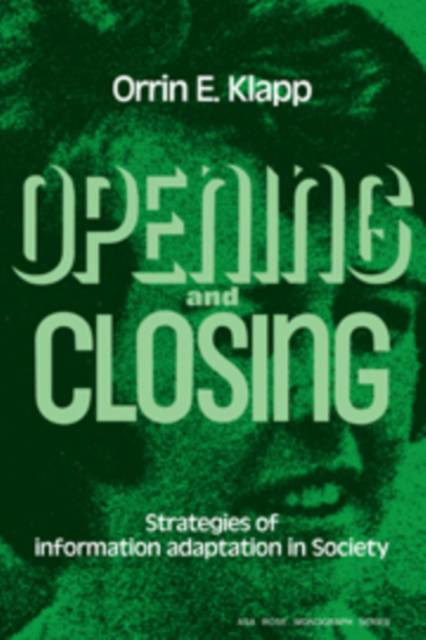
- Afhalen na 1 uur in een winkel met voorraad
- Gratis thuislevering in België vanaf € 30
- Ruim aanbod met 7 miljoen producten
- Afhalen na 1 uur in een winkel met voorraad
- Gratis thuislevering in België vanaf € 30
- Ruim aanbod met 7 miljoen producten
Zoeken
Omschrijving
In this original application of information theory to social analysis, Orrin Klapp examines how and why societies are producing more stress than they ever can handle. He argues that the reduction of 'social noise', the chaos from which we try to construct meaning is a major goal of individuals and groups alike. Individuals, groups, even entire societies normally cycle rhythmically between two basic modes of adaptation to the constant communication flow: opening, or scanning for desired information; and closing, or defending against noise. For example, in a society functioning in the opening mode, movements like ecumenicism and expansionism achieve momentum. Extreme reactions in either mode lead to an opposite swing, according to Professor Klapp's model. His wide-ranging conceptual scheme incorporates hypotheses about the variety and redundancy of information, as well as about human channel capacities and the need for homeostatis. His research reveals intriguing relationships among such phenomena as the concern about industrial population and the search for ethnic roots.
Specificaties
Betrokkenen
- Auteur(s):
- Uitgeverij:
Inhoud
- Aantal bladzijden:
- 240
- Taal:
- Engels
- Reeks:
Eigenschappen
- Productcode (EAN):
- 9780521293112
- Verschijningsdatum:
- 29/09/1978
- Uitvoering:
- Paperback
- Formaat:
- Trade paperback (VS)
- Afmetingen:
- 152 mm x 229 mm
- Gewicht:
- 358 g

Alleen bij Standaard Boekhandel
+ 129 punten op je klantenkaart van Standaard Boekhandel
Beoordelingen
We publiceren alleen reviews die voldoen aan de voorwaarden voor reviews. Bekijk onze voorwaarden voor reviews.







